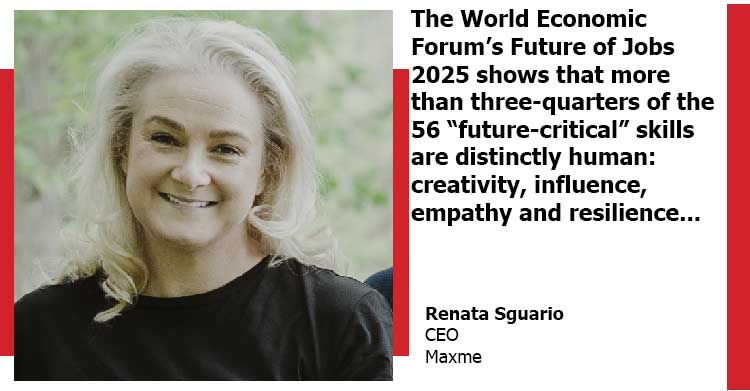From Code to Connection: Four Moves HR Leaders Can Make Now to Build Human – First Cultures | Renata Sguario | CEO | Maxme

Why human (soft) skills are business-critical
When every organisation is racing to embed AI, cloud and analytics, the real differentiator is the capability sitting between the keyboard and the chair. The World Economic Forum’s Future of Jobs 2025 shows that more than three-quarters of the 56 “future-critical” skills are distinctly human: creativity, influence, empathy and resilience. World Economic Forum Two-thirds of all jobs in 2030 will be “human-skill intensive”.
Yet most learning budgets are still overweight technical up-skilling. Here are four evidence-based shifts HR teams in India can implement now to close that gap and drive measurable performance (and bottom line) gains.
1. Switch from “gap fixing” to strengths-powered pipelines
Traditional development starts with a competency gap analysis. Progressive employers flip the script: they help people discover and deploy their natural strengths first, then layer technical skills.
Take National Australia Bank’s Innovation Centre in Gurugram. Facing rapid growth, NAB India partnered with Maxme to run a seven-week Team Brilliance program for emerging leaders. The focus was self-awareness, team strengths and communication. The result? 100 per cent positive feedback on all three modules and statistically significant lifts in confidence and on-the-job behaviours. Maxme – We maximise human potential.
Action for HR: embed a validated strengths assessment at the start of every leadership or graduate pathway. Coach managers to assign stretch projects aligned to individual super-powers rather than simply filling gaps.
2. Deliver learning in the flow of work, not beside it
Time-poor employees rarely finish lengthy e-learning. Programs such as Maxme’s Aquila (high-potential graduates), Altus (new leaders), Flareo (front-line managers) and MaxInUs (enterprise-wide resilience) use a “binge-worthy” model: app-based micro-lessons (five minutes a day), reflection nudges in your communications platform, and fortnightly group coaching. Completion rates consistently exceed 90 per cent, and users report a 25 per cent uplift in targeted behaviours within eight weeks.
Action for HR: audit your catalogue. If critical soft-skill modules can’t be consumed on a smartphone in under ten minutes, refactor them. Pair digital learning with human facilitation – the research is clear that groups accelerate habit formation.
3. Track application, not attendance
Learning is only an asset when it changes behaviour. Leading organisations are moving away from seat-time metrics and toward real-world impact dashboards:
● Confidence scores – pre- and post-program self-ratings on skills like giving feedback.
● Manager observations – simple fortnightly pulse surveys asking “Did you see the skill in action?”
● Business KPIs – track post-program gains in productivity and team engagement alongside learning analytics- you’ll be pleasantly surprised.
Action for HR: bake three metrics into every soft-skills initiative: behavioural confidence, observed usage and a business performance proxy (e.g., service turnaround, retention). Publish results internally to build stakeholder confidence – and bigger budgets.
4. Reward what you want repeated
Employees quickly realise which behaviours truly matter by observing what gets promoted and paid. Future-fit employers now:
● weight human-skill indicators (collaboration, adaptability, inclusive leadership) at 40-50 per cent in performance reviews;
● link incentives to team, not just individual, outcomes to reinforce shared success;
● spotlight role models in town-halls and social channels to create pull-based adoption.
Action for HR: run a quick diagnostic on your performance system. If human-skill markers contribute less than one-third of the final rating, recalibrate. Partner with finance to model a bonus structure that makes cross-functional teamwork as valuable as technical delivery.
The HR opportunity
India’s talent market is young, digital and ambitious. But research shows Gen Z employees prioritise culture, growth and purpose over pay alone. When organisations treat human skills as mission-critical infrastructure – not “soft” nice-to-haves – they unlock faster innovation, stronger engagement and real bottom-line advantages.
HR sits in the cockpit of this shift. By powering pipelines with strengths, serving learning in the flow of work, measuring application and hard-wiring human skills into reward, people leaders can build organisations where technology scales – and humans soar.
The question is no longer if soft skills matter. It’s how quickly we embed them before the next market disruption hits. The playbook is here; and your competitive advantage is waiting.


